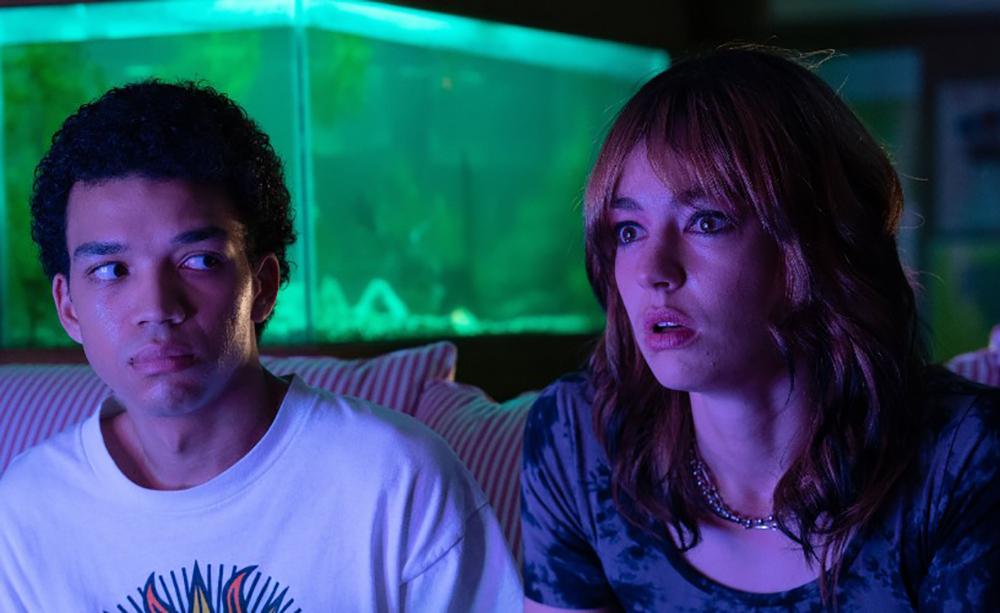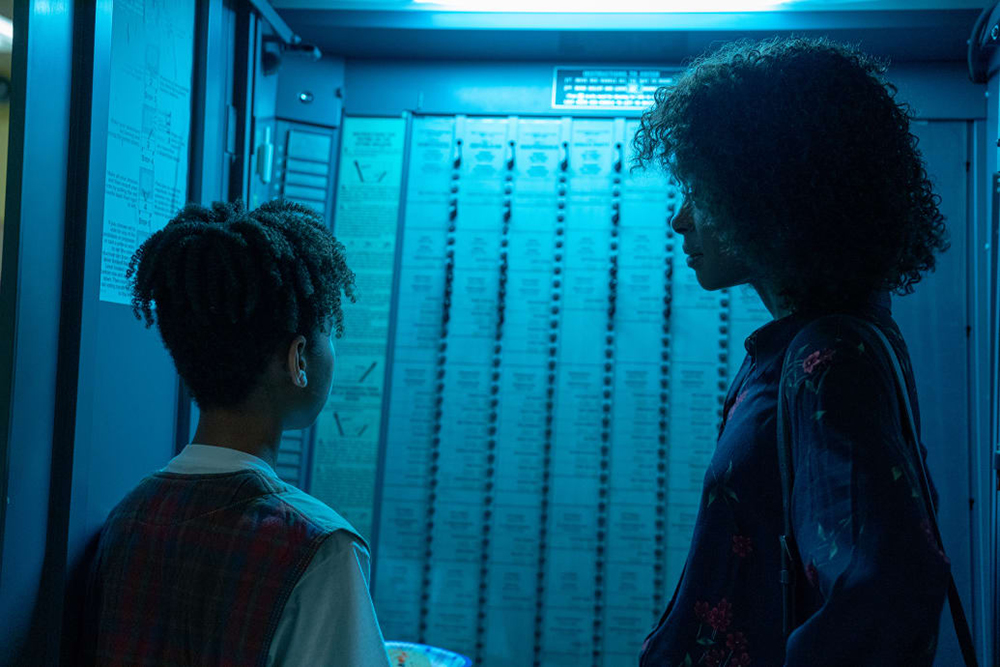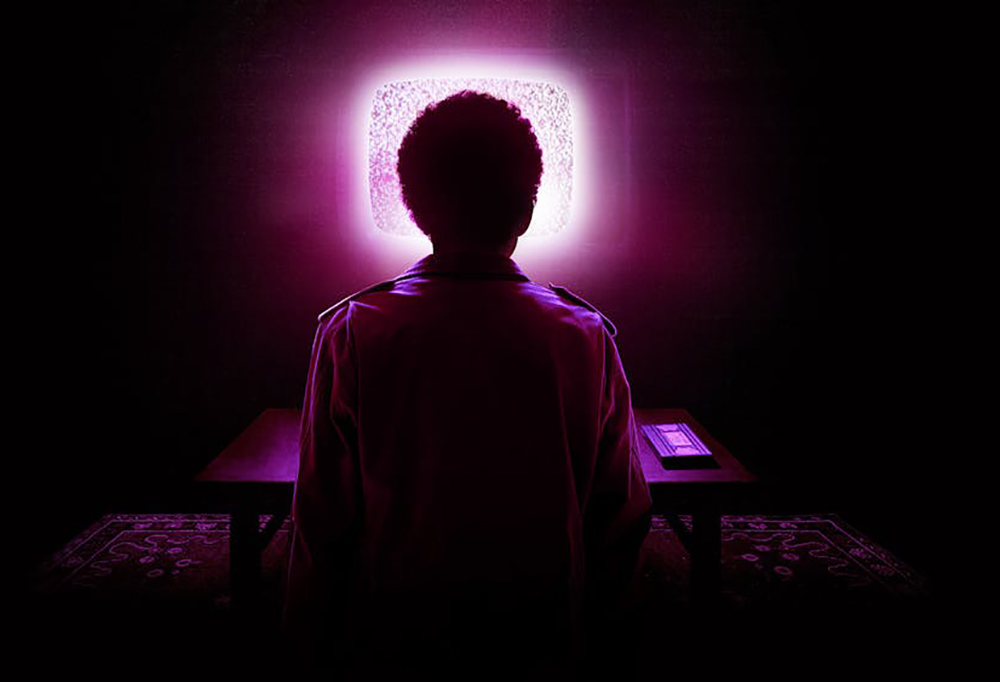“I Saw the TV Glow” is one of those rare cinematic experiences that will stick with me for a long while. I’d initially gone to see the movie with the idea in mind that it was a horror/comedy, though where I got this from, I’m not sure. A warning, in case of confusion: this is not a horror/comedy; and if that is what you are looking for, this may not be the film for you. “I Saw the TV Glow” is so much more. It is an emotive, poignant, and at times disturbing cinematic journey I was not entirely prepared for. Consequently, I have not been able to shake the film since watching.
There are so many visual elements to “I Saw the TV Glow” that hooked me from the very beginning; much like Maddy (Brigette Lundy-Paine) and Owen (Justice Smith) find themselves inexplicably drawn towards the ‘Pink Opaque’ TV show, around which the film centres.
I found myself utterly captivated from the beginning with its dazzling opening credits. The film is visually bold and vibrant with a winning, energetic soundtrack. For those like me who are hypersensitive, it offered up an exciting and stimulating sensory experience that had me glued to my seat, staring at the screen in awe and delight. In fact, one of the strongest elements of this film, I believe, is its aesthetics. It teases and blends colour throughout, even in the most minor of details. It juxtaposes the painful realities of the film with fun, cartoon like elements that are at times unsettling and jarring. And as Owen and Maddy frequently question and challenge reality and explore their identities, we too must question at every stage the real ‘truth’ in what we are seeing and experiencing.
A Film that is Visually Bold and Vibrant
Even so, I connected with the film in a way I didn’t anticipate, which made it, at times, extremely hard to digest. In fact, I’d challenge anyone to watch “I Saw the TV Glow,” and not have it speak to them personally. As we watch Owen try to navigate his way through the adolescent school years, along with a troubling home life (shout out to Fred Durst, aka Limp Bizkit, who makes a surprising appearance as the dominant father figure), many of us will painfully empathise with his loneliness, isolation, and desperation in trying to find a connection, to feel something. As young Owen sits in the school hall alone, and later wanders the school halls as an adult, we can’t help but share in his detachment from his surroundings and from his own sense of self.
A defining moment that continues to haunt me is when Owen turns and says to Maddy, on discussing their sexuality: “When I think about that stuff it feels like someone took a shovel and dug out all of my insides…But I’m still too nervous to open myself up and check.” And we must give credit here to Ian Foreman (young Owen) and Justice Smith (adult Owen), who both portray the character superbly. They both give, in my opinion, the performance(s) of the year. Though at times disturbing and difficult to watch, both actors explore and bring to light pivotal themes and topics surrounding adolescence, and the pain of trying to navigate this whilst feeling uncomfortable in your own skin. For those who can resonate, it will certainly strike a nerve.

As Owen finds solace and relief in a friendship with Maddy, albeit through a shared obsession with the ‘Pink Opaque,’ we can too look back on the TV shows that defined our teenage years, and reflect on how they served as an escape from everyday life. It was impossible to watch “I Saw the TV Glow” and not think back to classic ’90s shows such as “Buffy the Vampire Slayer,” “Goosebumps,” and “Are you Afraid of the Dark?’
An Exploration of Self
I couldn’t help but remember how these shows thrilled, terrified, and comforted me during the difficult adolescent years. Like Owen and Maddy, I remember watching these shows at a time when I wished for nothing more than to be sucked into the screen to join characters who existed in worlds that seemed so much more exciting and meaningful than my own. And it is through these worlds that Owen connects with a self that until now, has been repressed and rejected. Mollycoddled by his mother, and raised by a father who projects masculinity—“isn’t that show for girls?”—Owen begins to finally explore his trans side as he dons clothes resplendent of leading character Isabel in the ‘Pink Opaque.’
At the very core of the film, and what made it so terrifying for me, is its punitive depiction of time. In my opinion, time is the ‘monster’ of this horror, an ever looming presence that has the potential to engulf and destroy. The agonisingly slow monotony of Owen’s school days, contrasted with Maddy’s urgent desperation to escape a town in which she fears she will die; and alongside this, Owen’s mother gradually losing battle with a terminal illness.
A Final Message of Hope

As Maddy disappears from his life, Owen’s adult years rush by, devoid of colour and vibrance. He takes on the ‘typical’ masculine role of his father as he moves into his deceased parents’ home, where he claims to have family (who we never see) and removes all traces of the TV show he once loved. Even when he rewatches his favourite episodes, he finds the magic and mystique has gone. They are replaced with a disappointment and embarrassment reflected in how he views himself and the life he has built around him. His health is declining, and we are constantly aware that he is rapidly running out of time.
Yet in the film’s final moments, Owen takes control of a life that he is slowly losing a hold of, as we see written on the pavement hope in a message that reads “There is Still Time.” In an act of heroic retribution, Owen chooses a course of action that allows him to revel things that have always been there, but have been hiding under the surface. Spoilers will not be given; however, the final message is one of hope: it’s never too late, and there is still time.
“I Saw the TV Glow” is currently available to watch on most streaming networks.



